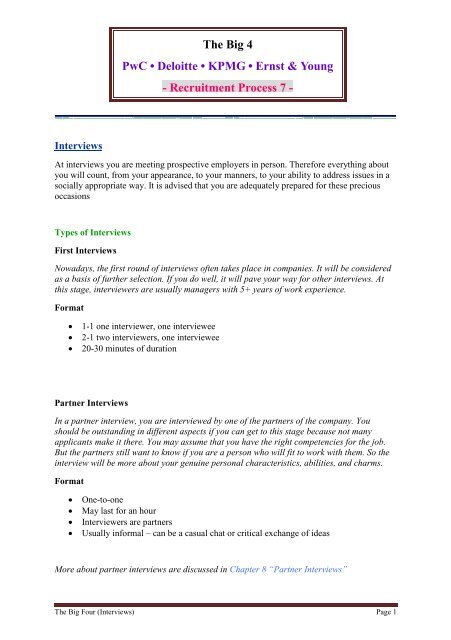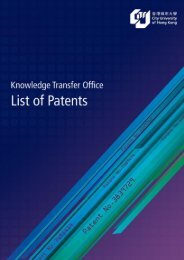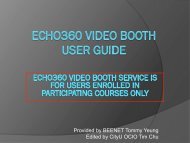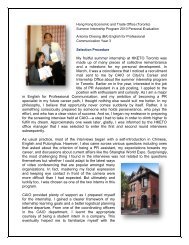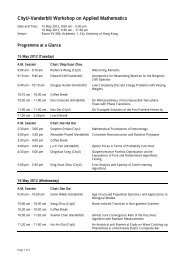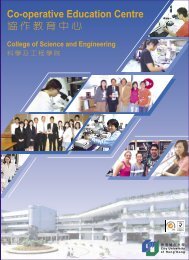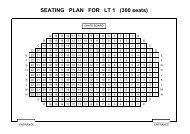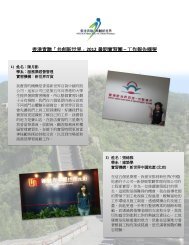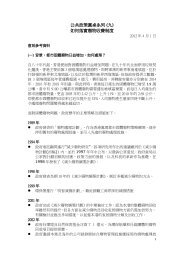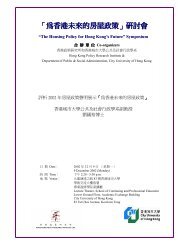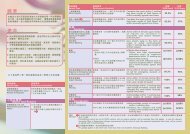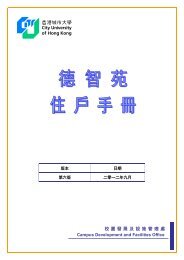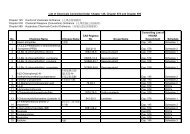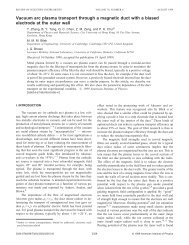The Big 4 PwC • Deloitte • KPMG • Ernst & Young - Recruitment ...
The Big 4 PwC • Deloitte • KPMG • Ernst & Young - Recruitment ...
The Big 4 PwC • Deloitte • KPMG • Ernst & Young - Recruitment ...
You also want an ePaper? Increase the reach of your titles
YUMPU automatically turns print PDFs into web optimized ePapers that Google loves.
Interviews<br />
At interviews you are meeting prospective employers in person. <strong>The</strong>refore everything about<br />
you will count, from your appearance, to your manners, to your ability to address issues in a<br />
socially appropriate way. It is advised that you are adequately prepared for these precious<br />
occasions<br />
Types of Interviews<br />
First Interviews<br />
Nowadays, the first round of interviews often takes place in companies. It will be considered<br />
as a basis of further selection. If you do well, it will pave your way for other interviews. At<br />
this stage, interviewers are usually managers with 5+ years of work experience.<br />
Format<br />
1-1 one interviewer, one interviewee<br />
2-1 two interviewers, one interviewee<br />
20-30 minutes of duration<br />
Partner Interviews<br />
In a partner interview, you are interviewed by one of the partners of the company. You<br />
should be outstanding in different aspects if you can get to this stage because not many<br />
applicants make it there. You may assume that you have the right competencies for the job.<br />
But the partners still want to know if you are a person who will fit to work with them. So the<br />
interview will be more about your genuine personal characteristics, abilities, and charms.<br />
Format<br />
<strong>The</strong> <strong>Big</strong> 4<br />
<strong>PwC</strong> <strong>•</strong> <strong>Deloitte</strong> <strong>•</strong> <strong>KPMG</strong> <strong>•</strong> <strong>Ernst</strong> & <strong>Young</strong><br />
- <strong>Recruitment</strong> Process 7 -<br />
One-to-one<br />
May last for an hour<br />
Interviewers are partners<br />
Usually informal – can be a casual chat or critical exchange of ideas<br />
More about partner interviews are discussed in Chapter 8 “Partner Interviews”<br />
<strong>The</strong> <strong>Big</strong> Four (Interviews) Page 1
Advice for interviews<br />
NEVER LIE!<br />
Prepare yourself -- good self understanding — learn to articulate about yourself<br />
Know your employer/career field<br />
Research about the company before you go for an interview<br />
Understand clearly the job requirements and selection criteria<br />
Always match strengths/competencies with job requirements (Your Key Unique<br />
Selling Points)<br />
KSPQI approach (Knowledge, Skills, Personal Qualities, Interests)<br />
PAR/STAR approach (Project—Situation--Task, Action, Result)<br />
Good general knowledge (current affairs)<br />
Good professional knowledge (e.g. GPA)<br />
DO NOT rehearse your answers!<br />
Interviews DO’s<br />
Appearance and manners DO’s<br />
Be confident & natural – Be yourself!<br />
Be punctual<br />
Be clean, tidy and presentable<br />
Maintain eye contact with the interviewers<br />
Smile and nod appropriately<br />
Show enthusiasm and interest in the job<br />
Answering Questions DO’s<br />
LISTEN to the questions carefully.<br />
Give DIRECT, CONCISE answers.<br />
Stay FOCUSED.<br />
Always MATCH your strengths/professional knowledge/skills/work experience with<br />
the job requirements.<br />
Give SPECIFIC examples to illustrate your point:<br />
o Describe an actual experience in which you demonstrate your leadership.<br />
o Use PAR/STAR approach.<br />
Answer questions HONESTLY.<br />
o DO NOT give model answers.<br />
Show INDEPENDENT and LOGICAL thinking<br />
o DO NOT REPEAT others’ views without having thought deeply about them.<br />
Answer the HIDDEN questions.<br />
BE PREPARED to be asked awkward questions. Examples:<br />
o Your GPA is low, why?<br />
o Well, you did not do well in public examinations.<br />
o You have sat for HK Advanced Level Exam. three times already.<br />
<strong>The</strong> <strong>Big</strong> Four (Interviews) Page 2
Interview DON’Ts<br />
Appearance and manners DON’Ts<br />
Be late<br />
Be sloppy, narrow-minded, rude and passive<br />
Try to be someone else<br />
Answering Questions DON’Ts<br />
Memorize and recite answers to questions<br />
Lie, bluff, or try to please<br />
Beat around the bush or ramble<br />
Talk too much/too little<br />
Oversell yourself or being over-humble<br />
Become emotional or defensive<br />
Try to be funny<br />
Unduly emphasize on starting salary<br />
Linger over fringe benefits<br />
Questions to the Interviewers<br />
In many interviews, you may be invited to ask questions about the company or the job. Ask<br />
questions that DEMONSRATE your knowledge of the job and your interest in the job.<br />
What is the corporate culture of your company?<br />
Can you describe what life is like working in this company?<br />
Why is this position open? Are there special expectations of the next person who fills<br />
this position?<br />
What will my main task/s be in the first year?<br />
How will my performance be assessed?<br />
Are there any opportunities for inter-departmental deployment and job rotation?<br />
Any opportunities for overseas job assignment?<br />
When will the interview results be announced?<br />
<strong>The</strong> <strong>Big</strong> Four (Interviews) Page 3
Interview Questions<br />
Interview questions can be roughly divided into the following categories. You may want to<br />
consider devising a strategy when formulate your answers for each of the categories.<br />
<strong>•</strong> Personal Experience<br />
<strong>The</strong>se are questions about you and your experience. <strong>The</strong>y may be a good way to establish<br />
interview rapport and let the interviewers get to know more about you. So be spontaneous.<br />
However, try not to get carried away by answering too much or too enthusiastically.<br />
<strong>•</strong> Competencies<br />
<strong>The</strong>se are questions about your competencies. Apply the KSPQ and the PAR/STAR approach<br />
whenever appropriate. Be specific, honest, and concise.<br />
<strong>•</strong> Work or Internship Experience<br />
You can answer these questions well when in fact you did reflect on your work or internship<br />
experience. Developing a serious attitude for work will also help. Consider using the<br />
PAR/STAR in suitable question situations.<br />
<strong>•</strong> Career Planning and Maturity<br />
Developing a positive and serious attitude on work will make these questions easy. What is<br />
required to answer these questions is whether you have given actual thoughts to your career<br />
as if you are treating it like a project -- with specific plans contingencies and actions. Most<br />
importantly, does the planning delight you?<br />
<strong>•</strong> Knowledge of the Profession<br />
This possibly covers your (i) book knowledge and (ii) field knowledge that you obtain from<br />
working in projects, summer jobs, and internships, and (iii) current knowledge related to the<br />
field. Answers showing that you have thought deeply about the profession and field will help.<br />
It is a matter of developing a positive and serious attitude toward work and keeping yourself<br />
abreast of what is happening in the field.<br />
<strong>•</strong> Knowledge of Employer<br />
Answering these questions requires good company background research. It means lots of<br />
research through the Internet and other venues such as friends who work in the field. It also<br />
means thinking and organizing the information in a way that enables you to show that you<br />
have a thorough understanding of the company and the field.<br />
<strong>•</strong> Scenario-based Questions<br />
In this type of question, you will be given a scene or situation that arises in the work context.<br />
This sort of questions requires people knowledge and a good understanding of how<br />
companies work. <strong>The</strong>re are no right or wrong or straightforward answers. To show that you<br />
have considered the issue from multiple perspectives and the possible consequences of your<br />
actions may be important when answering this type of questions.<br />
<strong>The</strong> <strong>Big</strong> Four (Interviews) Page 4
<strong>•</strong> Current Affairs<br />
Read your newspaper -- the right sections, and learn to analyze issues from your own<br />
perspective as well as those of other parties. Learn to apply what you have learnt from your<br />
books and work to current issues.<br />
Any Other Information<br />
Any general questions related to the job you have applied for or to you.<br />
<strong>The</strong> <strong>Big</strong> Four (Interviews) Page 5


